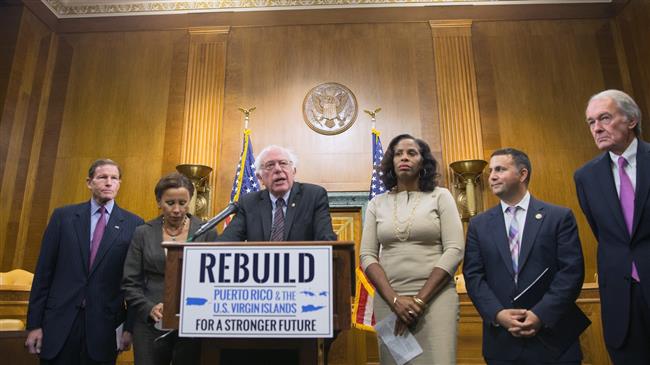Bernie Sanders pushes plan to guarantee all Americans a job
Independent US Senator Bernie Sanders is preparing to release a plan for the federal government to guarantee a job with at least a $15-per-hour wage and health benefits to every adult American “who wants or needs one.”
A representative from Sanders’ office told The Washington Post that planning for what is being called a “jobs guarantee program” is still in its early stages, and the way in which it will be funded has yet to be determined.
According to the Post, Sanders' plan would create 12 districts within the US that would approve jobs plans from municipalities, states, and American Indian tribal governments and then pass those plans along to the Labor Department for final approval.
Resembling Franklin Roosevelt’s famous New Deal the plan would fund projects across the country and also utilize job training centers to train and connect workers with jobs on the new projects.
Last week, Senator Kirsten Gillibrand of New York also tweeted support for a jobs guarantee, saying it would help "regular Americans who are unemployed and willing to work to better their local community."
If Republicans could give $1.5 trillion in tax cuts to corporations and the wealthiest among us, why can’t we invest a similar amount in a guaranteed jobs plan for regular Americans who are unemployed and willing to work to better their local community?
— Kirsten Gillibrand (@SenGillibrand) April 17, 2018
Is a jobs guarantee plan possible?
The jobs guarantee idea has long been discussed by liberal economists and activists who argue the guarantee would drive up wages for working Americans and reduce inequality by lowering unemployment rates for minorities.
Advocates also say that a jobs guarantee would help the government more swiftly respond to recessions, since laid off workers could be absorbed into the new program.
If America were to implement such a program, it would not be the first. For instance the South Korean government has pledged to create 810,000 public sector jobs over five years — such as teaching jobs, police, and social workers.
Opponents of the plan say that government intervention to raise wages could lead to private businesses cutting costs in other areas, including hiring fewer employees. Sanders is a longtime advocate of "Fight for 15," the national movement aimed at raising the minimum wage to $15 per hour.
Adam Ozimek, a senior economist at Moody's Analytic, wrote in Forbes that the idea of a jobs guarantee program is “absurd.”
“Here is my argument: nationalizing a quarter or more of the labor market is such an obviously bad and absurd idea that it's more interesting to talk about what it's [sic] popularity is saying than actually debate the economics,” he wrote.
The proposal would have trouble gaining enough Democratic support to get real traction and conservatives have long said a jobs promise is unsustainable and unaffordable, citing costs, the effects on the private sector and the possibility of inflation.
Relentless Israeli ceasefire violations justify need for self-defense: Lebanese MP
Tel Aviv tells Damascus Israeli forces will remain in occupied territory: Report
Dec. 22: ‘Axis of Resistance’ operations against Israeli occupation
‘Abhorrent’: Oxfam says only 12 trucks delivered aid in North Gaza since Oct.
VIDEO | Leader receives religious eulogists on Hazrat Fatima birth anniv.
Pope Francis slams Israel’s ‘machine-gunning’ of Gaza children
US hostage-taking of Iranian nationals violation of intl. law: Deputy FM
VIDEO | Carol Singers for Palestine on London’s Parliament Square












 This makes it easy to access the Press TV website
This makes it easy to access the Press TV website